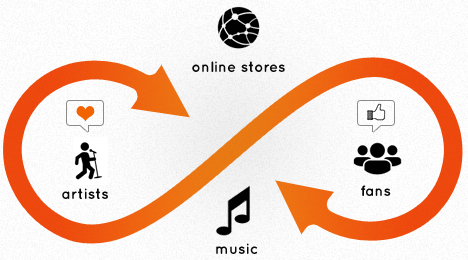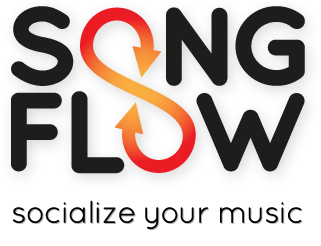 Back when we attended the 2013 Winter Music Conference, we spent some time during days one and two wandering through the opening exhibits – with the exception of Pioneer’s table, this aspect was the most underwhelming of the conference. However, even just browsing, one booth caught my attention – a table for digital marketing platform Songflow. While not specifically targeted at DJs and electronic music producers and performers, it seemed useful and in line with the conference’s panels and messages (like giving your music away for free), so since WMC wrapped up a month ago, we decided to look into the application and determine if it’s useful or just a flash in the pan.
Back when we attended the 2013 Winter Music Conference, we spent some time during days one and two wandering through the opening exhibits – with the exception of Pioneer’s table, this aspect was the most underwhelming of the conference. However, even just browsing, one booth caught my attention – a table for digital marketing platform Songflow. While not specifically targeted at DJs and electronic music producers and performers, it seemed useful and in line with the conference’s panels and messages (like giving your music away for free), so since WMC wrapped up a month ago, we decided to look into the application and determine if it’s useful or just a flash in the pan.
Compared to some of the applications we’ve reviewed here, Songflow is relatively new — launched globally back in December 2012. Calling itself a “Do It Yourself (DIY) platform for a new generation” in its press release, Songflow claims it, as a streamlined digital distribution and social interface, allows artists control of all releases (album and singles) and social media fans to, ultimately, generate revenue from music.
Two-fold “socializing music” and better analytics are how Songflow supposedly distinguishes itself from the rest of its longer-standing competition (like Tunecore). Once an artist sets up an account (be aware you already need an active and set up Facebook account to do this), he or she distributes music from Songflow directly to popular music purchasing and listening applications and to social media for fans. At the moment, it appears that iTunes, Spotify, YouTube, and Facebook have received the most emphasis in statements, but other options include Last.fm, Deezer, 7digital, Blackberry, Aspiro, Omnifone, Amazon MP3, Google Play, Song Entertainment Network, Rdio, Ziggo, Simfy, We7, and WiMP.
Because Facebook and YouTube are the primary venues where listeners discover new music, the social sharing feature, in theory, builds a fan base.
But beyond these features, what sets Songflow apart from similar applications, according to founder Thomas van Wijk in Digital Music News is the tracking: “Tunecore, Ditto Music, Zimbalam and many smaller aggregators are basically portals that throw your music over the fence, so to speak. What happens from there?”
Instead, users receive a report of sales for music and who their fans are.
Setting up an account ends up being straightforward, assuming you have a full Facebook business profile fully filled out. Don’t have this? You’re essentially blocked from signing up for Songflow until you do so, but while this is somewhat of an annoyance, the rest of the application runs smoothly once this is done. All the user has to do is select music to upload, determine which, if not all, of the listening and distribution platforms to use, and specifying a subscription fee.
At a glance, the $6 per song per year fee (€5 for those in Europe) appears expensive, essentially a deterrent for putting your music up and one that could potentially turn off up-and-coming or DIY artists not wanting to spend much, particularly on an application that’s still in beta and not widely used.

Once you take out the price, Songflow’s features and easy setup look to save an artist time in getting his music out there. But beyond the one-click distribution, allowing artists 100 percent of all earnings, and clear reports, what else does Songflow offer that isn’t more than being a Hootsuite for musicians?
Going back to what was said at WMC about putting your music out there, when a song is up on iTunes but no one knows to look for it, an artist simply doesn’t make much money. In this regards, the social integration makes your fans, assuming you have them, know your track or album is out there. As far as growing a fan base is concerned, Songflow seems to operate under the assumption that social media users will share content, allowing your fan base to increase, but when no one shares the content, then what? Ultimately, this aspect would work better if an artist has a small but still established fan base, rather than depending on the application to help grow followers.
At the moment, Songflow is one of those applications that could go either way: interesting and convenient on the surface but without enough mileage to really be worth the price. However, since its announcement in December, Songflow has already started forming partnerships with PledgeMusic, a direct-to-fan funding platform; Fuga, a digital product factory; and Unsigned Only, an international music competition that offers a $10,000 cash prize and promises to connect artists with industry professionals.
This latter point looks to be a long-term goal for the application, ultimately to be an A&R platform for industry professionals to find and connect with unsigned artists. While it’s a lofty goal for such a new application, we’ll wait to see what happens.




